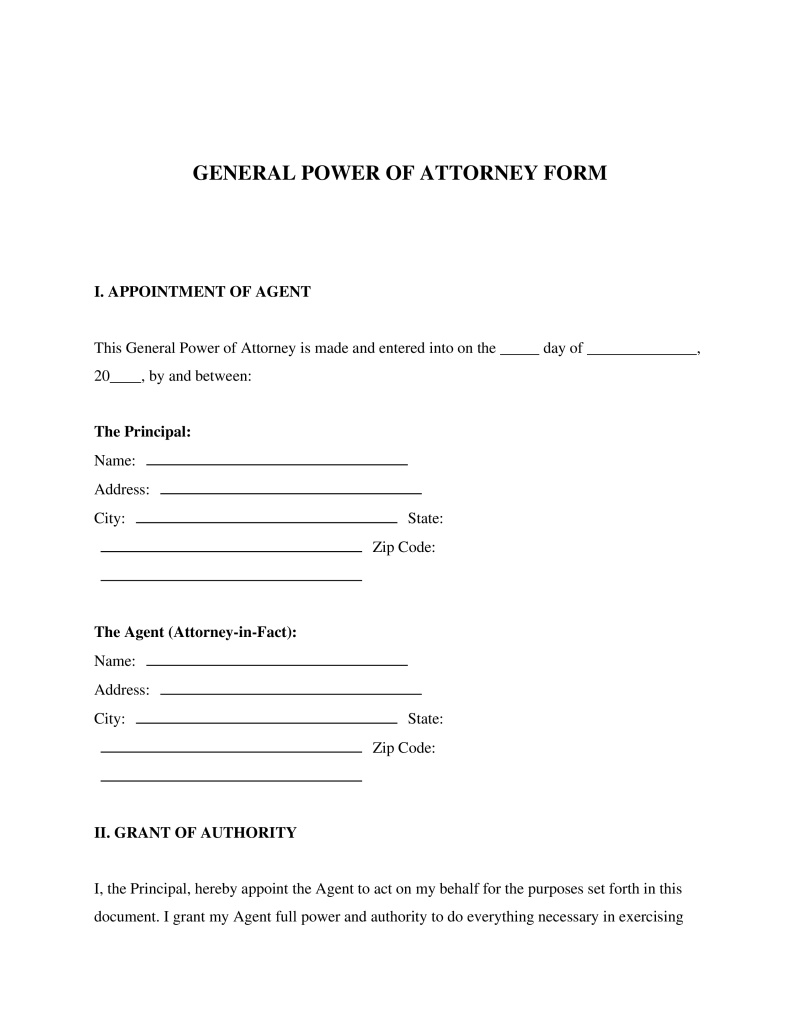A General Power of Attorney Form authorizes an agent to act on behalf of the principal in financial and legal matters, ensuring representation.
Poa Scope Type
A Durable POA remains effective if you become incapacitated. A Non-Durable POA ends if you become incapacitated. Springing POA becomes effective only upon a specific event (e.g., incapacity).

Table of Contents
What is a General Power of Attorney Form?
A general power of attorney form is a legal instrument that authorizes one individual, known as the agent or attorney-in-fact, to act on behalf of another person, referred to as the principal. This document grants the agent broad administrative powers to handle financial, business, and legal affairs effectively creating a proxy for the principal in various transactions. Principals typically utilize this instrument when they need assistance managing their obligations due to travel, temporary absence, or convenience rather than medical necessity. The authority conferred by this specific document traditionally terminates if the principal becomes incapacitated or mentally incompetent, distinguishing it from durable variations.
Scope of Authority and Responsibilities
The powers granted under this legal framework are extensive and allow the agent to perform almost any act the principal could perform personally regarding financial and legal matters. Agents typically manage banking transactions, buy or sell real estate, settle claims, operate business interests, and file tax returns. The principal retains the right to revoke this authority at any time provided they maintain mental competency.
Fiduciary duties bind the agent to act in the best interest of the principal. This legal obligation requires the agent to keep accurate records of all transactions, avoid conflicts of interest, and keep the principal's assets separate from their own. Mismanagement or breach of these duties can lead to civil or criminal liability.
Requirements for a Valid General Power of Attorney
State laws dictate the specific formalities required to execute a legally binding general power of attorney form. Most jurisdictions share common elements necessary for validity:
- Mental Capacity - The principal must understand the nature and consequences of the document at the time of signing (common law standard).
- Written Format - The authorization must be in writing to be recognized by banks, courts, and other institutions.
- Notarization - A notary public must acknowledge the principal's signature to ensure authenticity and prevent fraud.
- Witness Requirements - Some states mandate the presence of one or two disinterested witnesses during the signing process.
- Agent Acceptance - Certain jurisdictions require the agent to sign an acknowledgment of their duties before acting.
How to Execute a General Power of Attorney Form
Step 1: Selection of Agent - Choose a trustworthy individual who possesses the organizational skills to manage financial and legal affairs.
Step 2: Drafting the Document - Use a template or legal counsel to create a document that specifically outlines the powers granted and any limitations imposed.
Step 3: Execution and Formalities - Sign the document in the presence of a notary public and any required witnesses according to state law.
Step 4: Distribution of Copies - Provide the original or certified copies to the agent and financial institutions where the agent will transact business.
Termination of Authority
The authority granted by a general power of attorney form does not last indefinitely. Several specific events or actions will render the document void:
- Revocation by Principal - The principal signs a revocation of power of attorney form and delivers notice to the agent and relevant third parties.
- Death of Principal - All powers granted under the document cease immediately upon the death of the principal.
- Incapacitation - Unless the document is durable, the agent's authority ends if the principal becomes mentally incompetent.
- Expiration Date - The document may contain a specific termination date or be limited to the completion of a specific task.
- Resignation of Agent - The agent may step down from their role if they are no longer willing or able to serve.
Relevant Laws and Statutes
State statutes primarily govern the creation and enforcement of power of attorney documents, though federal regulations impact specific areas.
- Uniform Power of Attorney Act - Provides a standardized framework for the creation, validity, and durability of powers of attorney adopted by many states (UPOAA).
- Health Insurance Portability and Accountability Act - Mandates specific language or separate releases for agents to access a principal's protected health information (45 CFR § 164.508).
- IRS Form 2848 Regulations - Governs the appointment of a representative for federal tax matters, requiring a specific federal form rather than a standard general power of attorney (26 CFR § 601.503).
- Real Property Recording Statutes - Requires powers of attorney used for real estate transactions to be recorded in the county public records (varies by state statute).
- Servicemembers Civil Relief Act - Offers protections and specific recognition for military powers of attorney regarding legal proceedings and financial obligations (50 U.S.C. § 3901 et seq.).
Frequently Asked Questions
Do you have a question about a General Power of Attorney Form?
Example questions:
Not the form you're looking for?
Try our legal document generator to create a custom document
Community Discussion
Share your experience and help others
Legal Notice: Comments are personal opinions and do not constitute legal advice. Always consult a qualified attorney for matters specific to your situation.
Comments (0)
Leave a Comment
No comments yet. Be the first to comment!